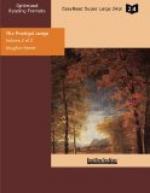“I reckon I ought to have twisted his neck,” he said with a deep breath.
CHAPTER VI
BETTY SETS OUT FOR TENNESSEE
Bruce Carrington came of a westward-looking race. From the low coast where they had first settled, those of his name had followed the rivers to their headwaters. The headwaters had sent them forth toward the foot-hills, where they made their, clearings and built their cabins in the shadow of the blue wall that for a time marked the furthest goal of their desires. But only for a time. Crossing the mountains they found the headwaters once more, and following the streams out of the hills saw the roaring torrents become great placid rivers.
Carrington’s father had put the mountains at his back thirty years before. The Watauga settlements had furnished him a wife, and some four years later Bruce was born on the banks of the Ohio. The senior Carrington had appeared on horseback as a wooer, but had walked on foot as a married man, each shift of residence he made having represented a descent to a lower social level. On the death of his wife he had embarked in the river trade with all that enthusiasm and hope he had brought to half-a-dozen other occupations, for he was a gentleman of prodigious energy.
Bruce’s first memories had to do with long nights when he perched beside his father on the cabin roof of their keel-boat and watched the stars, or the blurred line of the shore where it lay against the sky, or the lights on other barges and rafts drifting as they were drifting, with their wheat and corn and whisky to that common market at the river’s mouth.
Sometimes they dragged their boat back up-stream, painfully, laboriously; three or four months of unremitting toil sufficed for this, when the crew sweated at the towing ropes from dawn until dark, that the rich planters in Kentucky and Tennessee might have tea and wine for their tables, and silks and laces for their womenfolk. More often they abandoned their boat and tramped north, armed and watchful, since cutthroats and robbers haunted the roads, and river-men, if they had not drunk away their last dollar in New Orleans, were worth spoiling. Or, if it offered, they took passage on some fast sailing clipper bound for Baltimore or Philadelphia, and crossed the mountains to the Ohio and were within a week or two of home.
Bruce Carrington had seen the day of barge and raft reach its zenith, had heard the first steam packet’s shrieking whistle which sounded the death-knell of the ancient order, though the shifting of the trade was a slow matter and the glory of the old did not pass over to the new at once, but lingered still in mighty fleets of rafts and keel-boats and in the Homeric carousals of some ten thousand of the half-horse, half-alligator breed that nightly gathered in New Orleans. Broad-horns and mud-sills they were called in derision.




